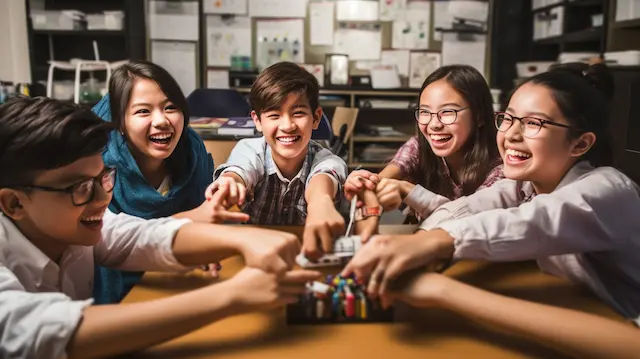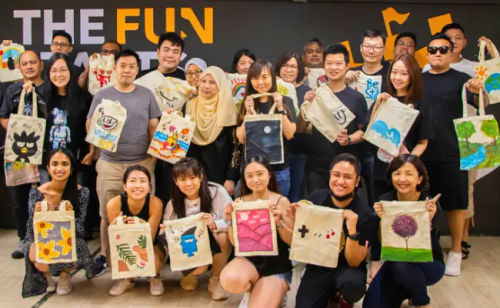Team Building Activities For Students Singapore

Team building activities play a crucial role in fostering positive interactions and personal development among students. In the bustling educational landscape of Singapore, these activities hold immense value in shaping students’ social skills, collaboration abilities, and problem-solving aptitude.
By engaging students in well-designed team building initiatives, schools and educators can provide an environment that nurtures cooperation, communication, and leadership skills. In this article, we will explore the top team building activities for students in Singapore, highlighting their unique features and benefits.
Why Team Building Matters for Students
Team building activities go beyond mere fun and games. They play a significant role in developing essential skills that are vital for students’ personal growth and academic success. By participating in team building exercises, students have the opportunity to enhance their collaboration, communication, and problem-solving skills. These activities encourage students to work together, fostering a sense of unity and cooperation. Through shared challenges and accomplishments, students learn the importance of teamwork, empathy, and mutual support.
Considerations for Team Building Activities
When selecting team building activities for students, consider the following factors to ensure their effectiveness and appropriateness:
- Age Appropriateness: Choose activities that align with the developmental stages of the students. Tailor the complexity and physical demands of the activities to suit different age groups.
- Group Size: Consider the number of students involved to ensure maximum participation and engagement. Adjust the activities accordingly, ensuring that everyone has an opportunity to actively contribute.
- Desired Outcomes: Define the specific goals and objectives you want to achieve through the team building activities. Align the activities with the skills and qualities you aim to develop, such as leadership, communication, problem-solving, or creativity.
- Interests and Abilities: Take into account the interests and abilities of the students. Choose activities that resonate with their passions and provide challenges that are within their capabilities. This ensures greater engagement and motivation.
- Educational Objectives: Integrate team building activities into the curriculum and educational objectives. Ensure that the activities support and enhance the learning outcomes in subjects such as teamwork, collaboration, and interpersonal skills.
Best Team Building Activities for Students in Singapore
1. Terrarium Workshop

The Terrarium Workshop is a team building activity for students that combines creativity, collaboration, and nature. Students design and build their own terrariums, fostering communication, teamwork, and problem-solving. It’s an engaging and educational experience that allows students to connect with each other and take home a unique terrarium as a symbol of their shared team building accomplishment.
2. Sports Day

Sports Day brings students together for a day of friendly competition and teamwork. Through a range of team-based activities such as relay races, tug-of-war, and team-building games, students learn the value of collaboration, communication, and sportsmanship. This activity promotes physical fitness, leadership skills, and fosters a sense of camaraderie among participants.
3. Art Collaborations

Art Collaborations provide a creative platform for students to work together and express themselves. Through collaborative art projects such as creating a mural, sculpture, or installation, students learn to communicate, compromise, and appreciate different perspectives. This activity nurtures teamwork, encourages innovative thinking, and showcases the power of collective effort.
4. Environmental Cleanup

An environmental cleanup activity brings students together to make a positive impact on their community. By cleaning up a local park or beach, students develop a sense of environmental responsibility, teamwork, and social awareness. This activity fosters collaboration, leadership skills, and instills a sense of pride in maintaining a clean and sustainable environment.
5. Cooking Challenge

The cooking challenge activity allows students to showcase their culinary creativity while working as a team. Divided into groups, students collaborate to plan, prepare, and present a meal together. This activity enhances communication, cooperation, and problem-solving skills as they navigate the kitchen, share responsibilities, and adapt to challenges.
6. Team-based Problem Solving

Team-based problem-solving activities present students with complex challenges that require collaborative efforts to find solutions. By working together, students develop critical thinking skills, effective communication, and the ability to leverage diverse perspectives. This activity encourages teamwork, creativity, and resilience in overcoming obstacles.
7. Outdoor Adventure Course

The outdoor adventure course provides students with exciting challenges such as high ropes courses, zip lines, and rock climbing. Through these exhilarating activities, students build trust, enhance teamwork, and develop resilience. The outdoor setting allows students to step out of their comfort zones, face fears, and work collaboratively to overcome obstacles.
8. Escape Room Experience

Escape room experiences engage students in a thrilling adventure where teams must solve puzzles, find clues, and escape within a given time limit. This activity requires effective communication, critical thinking, and teamwork. Students learn to collaborate under pressure, think creatively, and leverage each other’s strengths to achieve a common goal.
9. Team-Building Workshops

Team-building workshops are facilitated sessions that focus on developing essential skills for effective teamwork. These workshops provide students with insights into communication techniques, conflict resolution strategies, and leadership development. Through engaging activities and discussions, students learn to collaborate, build trust, and enhance their interpersonal skills.
10. Simulation Exercises

Simulation exercises create simulated scenarios that require teams to work together to tackle challenges. Whether it’s a simulated business scenario, crisis management exercise, or a group project simulation, students learn to collaborate, problem-solve, and make decisions under realistic conditions. This activity enhances teamwork, adaptability, and critical thinking skills.
Tips for Successful Implementation
To ensure the successful implementation of team building activities, consider the following tips:
- Communicate Clear Goals: Clearly communicate the goals and objectives of the team building activities to the students. Emphasize the importance of teamwork, cooperation, and personal growth. Set clear expectations for their involvement and participation.
- Provide Debriefing Sessions: Conduct debriefing sessions after each activity. Encourage students to reflect on their experiences, share insights gained, and discuss challenges faced. Facilitate open discussions to encourage critical thinking and self-awareness.
- Transfer Learning to Real-Life Situations: Help students apply the skills and lessons learned from team building activities to real-life scenarios. Encourage them to reflect on how the teamwork, communication, and problem-solving skills can be utilized in academic settings, personal relationships, and future careers.
- Foster Collaboration and Communication: Design activities that promote active collaboration and effective communication among team members. Encourage students to listen, respect diverse perspectives, and work together to achieve shared goals.
- Tailor Activities to Students’ Needs: Adapt activities to accommodate students’ individual needs, strengths, and areas for improvement. Provide opportunities for students to take on different roles within the team to develop leadership and followership skills.
- Celebrate Achievements: Recognize and celebrate the achievements and progress made by the students throughout the team building activities. Provide constructive feedback and encourage a positive and supportive learning environment.
Team Building Activities For Students Singapore
Team building activities hold immense value in shaping students’ social skills, collaboration abilities, and problem-solving aptitude. By incorporating the top team building activities into the educational journey of students in Singapore, educators can create an environment that fosters teamwork, resilience, and leadership qualities.
Through these experiences, students can develop essential skills that contribute to their personal growth, academic achievements, and future success. By prioritizing team building activities, educators and schools in Singapore are empowering their students with valuable lifelong skills.
Looking for more articles? Check out our recommendations below:
- Ultimate Guide To Team Building In Singapore (2025)
- Best Team Building Activities In Singapore (2025)
- Best Team Building Activities For Small Groups in Singapore (2025)
- Best Team Building Games For Adults in Singapore (2025)
- Best Team Bonding Games for Students in Singapore (2025)
Frequently Asked Questions (FAQ)
If you have any questions about team building activities for students in Singapore, you can refer to the frequently asked questions (FAQ) about the best Team Building Activities For Students In Singapore below:
What age groups are team building activities suitable for?
Team building activities can be tailored to suit various age groups, from primary school to university students. Different activities can be designed to accommodate the specific developmental needs and abilities of different age groups.
What are the benefits of team building activities for students?
Team building activities promote collaboration, communication, problem-solving, leadership, and social skills among students. They foster a sense of unity, enhance personal growth, and contribute to academic success.
Are team building activities only for sports-oriented students?
No, team building activities are not limited to sports-oriented students. They are designed to develop various skills and can be tailored to suit different interests and abilities, including artistic, intellectual, or social pursuits.
How can team building activities be integrated into the school curriculum?
Team building activities can be integrated into the school curriculum by incorporating them into subjects like physical education, social-emotional learning, or leadership development programs. They can also be conducted as extracurricular activities or during school events.
Can team building activities be conducted indoors in Singapore’s hot and humid weather?
Yes, there are plenty of indoor team building activities available in Singapore. These activities can be conducted in air-conditioned venues, such as escape rooms, creative workshops, or indoor sports facilities.
How can team building activities enhance students’ academic performance?
Team building activities improve students’ interpersonal skills, communication, and problem-solving abilities, which are transferable skills that contribute to academic success. Students learn to work effectively in groups, collaborate on projects, and think critically.
Are there team building activities that promote cultural diversity and inclusivity?
Yes, team building activities can be designed to celebrate cultural diversity and promote inclusivity. Activities that encourage sharing cultural experiences, fostering understanding, and appreciating different perspectives contribute to creating an inclusive and respectful environment.
How can team building activities help in building resilience among students?
Team building activities often involve facing challenges and overcoming obstacles. By navigating through these challenges together, students develop resilience, adaptability, and a positive mindset when confronted with difficulties in various aspects of life.
How can team building activities improve students’ communication skills?
Team building activities require effective communication among team members to solve problems, coordinate efforts, and achieve goals. Through these activities, students develop active listening skills, clarity in expression, and the ability to work collaboratively.
What is the role of facilitators or educators during team building activities?
Facilitators or educators play a crucial role in guiding and supervising team building activities. They provide instructions, facilitate discussions, encourage participation, and offer feedback to ensure a safe, inclusive, and productive experience for students.
